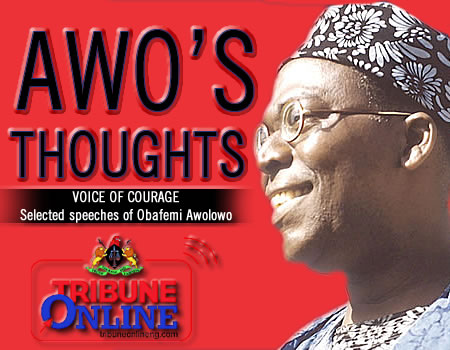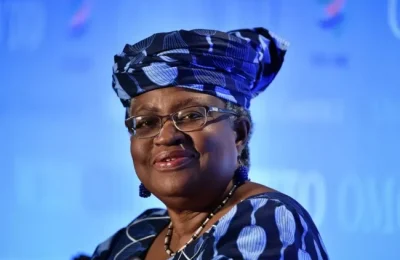CONTINUED FROM LAST WEEK
The question which then arises is this: what modus operandi should Nigeria adopt in order to discharge effectively its three obligations which, as we have seen, do no! always harmonize, because of the conflicting and divergent self-interests of all the countries that compose the world?
First of all, Nigeria must recognize the difference between fo.reign policy and foreign affairs. It must then rHrceed, most carefully, to formulate and declare for itself an abiding foreign policy, which will remain immutable through all the buffetings and vicissitudes of international conflicts and collisions.

There is, in our considered view, a good deal of difference between the declaration of external policy and the conduct of external affairs The one is strategy, and the othe is tactics Wi a ship puts to sea, and is destined for a particular harbour, it c.,n l,e said that its policy is to sail to that harbour, come what may. Whether it pursues one of a number of alternative routes which lead to the specified harbour; and what manoeuvreing, detours and digressions it makes in the course of the journey; all these depend on the daily circumstances of the voyage, including the state of the weather and of the sea. But since the choice ofL3–bour must be necessitated by the need to satisfy the customers, it is not open to the shipowners, arbitrarily, to choose and vary the ship’s destination, as their own pleasures and fancies dictate.
As with the shipowners in our analogy, Nigerian leaders cannot and should not be permitted to determine and vary the country’s policy – external or domestic – without strict regard to the welfare and happiness of the Nigerian peoples.
A man cannot hold contradictory views or pursue contradictory courses of action at the sametime, unless he is a downright scum or a bare-faced hypocrite or both.
Granting, therefore, its adoption of the blueprint outlined in the last four chapters, and its adherence to the basic’ principles

expounded in Part II of this book, the external policy of Nigeria may be expressed in more concrete and detailed terms as follows:
(I) The active promotion of international understanding, and of the universal brotherhood of man.
(2) The constructive and peaceful encouragemet of the spread of socialism to all parts of the world, as the only economic and social concept which can eliminate greed and self-interest, and foster mutual love and altruism among all mankind.
(3) Active and enlightened co-operation with the other countries of the world, in so far as they genuinely believe in and respect the ideals for which Nigeria stands.
(4) Respect for the independence, sovereignty, and integrity of all States, and non-interference in their domestic affairs.
(5) Settlement of international disputes by peaceful negotiation either by the direct mediation of one or more countries invited for that purpose at till; States, or through the agency of the U.N.O.
(6) Non-involvement (i) in military pacts or acts of aggression;
or (ii) in any treaty designed against the interest of any other country.
(7) The promotion of free and mutually beneficial economic intercourse and cultural and scientific exchange among all the nations of the world.
(8) The solemn observance of the principles and objectives enshrined in the Charter of the UN.O. and of the O.A.U; and
(9) The extermination of apartheid, and tf~e termination of the subjugation and inhuman treatment of Black peoples in Africa and elsewhere, and the mobilization for these purposes of the’ material, intellectual, and spiritual resources of all the States of Africa and their friends.
– The tactics which will; from time to time, be adopted in achieving these objectives will depend on the prevailing circumstances, at any given time.
The policy, however). must never be abandoned nor should anything be allowed to dim Nigeria’s clear vision of it In pursuing and prosecuting the country’s declared policy, as set out in clearer detail above, compromises may be given and accepted.
But the compromises must be such as do not in any way amount to the slightest derogation from, or even pretended abandonment of the country’s declared policy. In this matter, to adapt a journalistic maxim, external policy must be regarded as sacred, whilst the conduct of external affairs is free within the bounds delimited by the country’s avowed and stated policy.
It is fashionable these days for all underdeveloped countries including Nigeria to describe their foreign policy as ‘non- alignment’, and to pride themselves on belonging to a Third World bloc. This, in our view, is a sign of an inferiority complex, or of confused thinking, or both. The external policy which we outlined above certainly cannot bear the label of ‘non-alignment’. If it is necessary that it must be christened, then its name would be
WORLD SOCIALISM.
It is also fashionable these days for many underdeveloped countries to seek to get the best of two opposing worlds by exploiting the deep-seated prejudices and insensate rivalry existing between the two power blocs: They insincerely and cunningly profess friendship with one bloc in order to induce the other or both of them to give financial and/or technical aids .. In our considered opinion, this is a most dishonourable mode of coducting a country’s external affairs, and Nigeria should avoid itwithout reservation. .
In this regard, we do fully realize that courage of conviction and for truth has been a very rare virtue, down the ages.
CONTINUES NEXT WEEK
READ ALSO FROM NIGERIAN TRIBUNE







